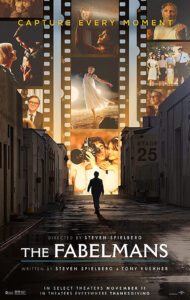 By Steve Crum
By Steve Crum
Had Alfred Hitchcock filmed the story of how he got interested in films, there could have been some very revealing moments. Like his father locking the child Hitch up in a local jail to teach him a lesson. Maybe Hitchcock’s introduction to the element of fear?
Now refocus on Steven Spielberg’s semi-autobiographical (or “auto biopic”) drama, The Fabelmans, co-written and directed by Spielberg. It could well have been titled The Spielbergs, were it a documentary. But The Fabelmans is based upon Steven Spielberg’s childhood, in the process renaming his relatives, including himself. 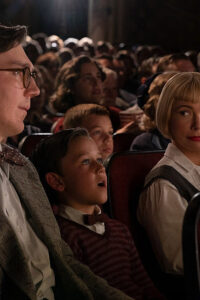 (Steven is “Sammy.”) The project has been over two decades in the making, being green lit once his parents had passed on. He did not want to hurt any feelings.
(Steven is “Sammy.”) The project has been over two decades in the making, being green lit once his parents had passed on. He did not want to hurt any feelings.
The result is an absorbing, revealing motion picture.
As recounted by Spielberg in previous interviews, he was first impacted at the movie theatre as a young boy in 1952. So it is with Sammy Fabelman. After seeing Cecil B. DeMille’s The Greatest Show on Earth, Sammy is awestruck (particularly at the circus train wreck sequence), mesmerized and inspired to duplicate what he had just seen at home. Using his father Burt’s (Paul Dano) 8mm camera, Sammy (Gabriel LaBelle) films his own silent version of crashing his newly acquired train set. His mother, Mitzi (Michelle Williams) encourages Sammy to pursue his new hobby, while his father is discouraging.
Sammy’s filming continues on a larger scale, sometimes including his three younger sisters in the shooting.
After the family has to move to another state due to Burt’s job, Sammy continues his amateur filmmaking—even including his fellow Boy Scout troops as extras in battle scenes.
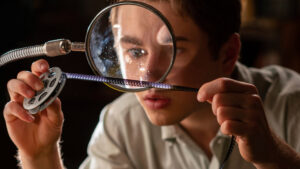 Sammy makes filming family outings, such as a camping trip, an occasion wherein he directs the action with experimentation of lighting and angles. Also involved in family activities is his father’s best friend and associate, Benny Loewy (Seth Rogen), whose presence-particularly during Sammy’s teen years—segues from jocular “uncle” to disruptive interloper.
Sammy makes filming family outings, such as a camping trip, an occasion wherein he directs the action with experimentation of lighting and angles. Also involved in family activities is his father’s best friend and associate, Benny Loewy (Seth Rogen), whose presence-particularly during Sammy’s teen years—segues from jocular “uncle” to disruptive interloper.
In the process, Sammy becomes more enamored with someday making a living creating movies. This is still much to his dad’s chagrin.
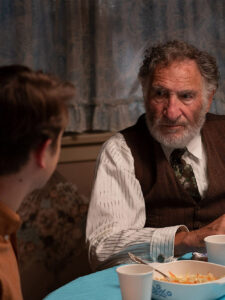 There is a wonderful performance by Judd Hirsch as Boris Podgorny, a granduncle and ex-film worker and circus lion tamer. He is a character for sure, but encourages Sammy to pursue his dreams with the realization of their conflict with family expectations. Such is the crux of The Fabelmans.
There is a wonderful performance by Judd Hirsch as Boris Podgorny, a granduncle and ex-film worker and circus lion tamer. He is a character for sure, but encourages Sammy to pursue his dreams with the realization of their conflict with family expectations. Such is the crux of The Fabelmans.
The film pivots when Sammy discovers a jarring secret while editing some family camping footage.
That said, a major change occurs when dad’s job forces him to move to Southern California—the land of sunshine and movies. Sammy’s dream world enlarges as the reality of his parents’ marriage is endangered.
The screenplay also covers Sammy’s encounters with anti-semitism, his college years, love life, and early TV production work.
Incidentally, a must-see is Sammy’s encounter with John Ford (played by director David Lynch), which is pretty much what occurred when Steven Spielberg first met the crusty director.
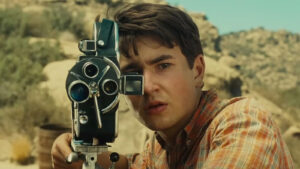 Overall, The Fabelmans is a unique telling by one of the most popular directors in cinema history.
Overall, The Fabelmans is a unique telling by one of the most popular directors in cinema history.
∞∞∞∞∞
GRADE on an A-F Scale: A-
∞∞∞∞∞
